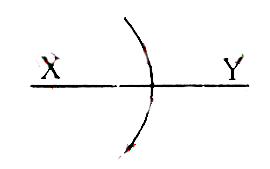A convex refracting surface of radius of curvature 20cm separates two media of refractive indices 4/3and1.60. An object is placed in the first medium (μ=4/3) at a distance of 200cm from the refracting surface. Calculate the position of image formed.
The correct Answer is:At 234.15cm in denser medium
Here, R=20cm,μ1=4/3,μ2=1.60
u=−200cm,v=?
As refraction occurs from rarer to denser medium,
therefore, −μ1u+μ2v=μ2−μ1R
−4/3−200+1.60v=1.6−4/320
1150+85v=0.2720
85v=0.2720−1150=4.05−2300
5v×2.05=2400
v=24005×2.05=234.15cm
(in denser medium)
Topper's Solved these Questions
- OPTICSBook:PRADEEPChapter:OPTICSExercise:Problems for practice
Explore 4 Videos
- OPTICSBook:PRADEEPChapter:OPTICSExercise:Comprehension 1
Explore 1 Video
- OPTICSBook:PRADEEPChapter:OPTICSExercise:Value based questions
Explore 3 Videos
- MAGNETIC EFFECT OF CURRENT AND MAGNETISMBook:PRADEEPChapter:MAGNETIC EFFECT OF CURRENT AND MAGNETISMExercise:Competition Focus (Multiple Choice Questions)
Explore 2 Videos
Similar Questions
A convex surface of radius of curvature 40 cm separate two media of refractive indices 43 and 1.50. An object is kept in the first medium at a distance of 20 cm from the surface. Calculate the position of the image.
View SolutionA concave spherical surface of radius of curvature 100 cm separates two media of refractive indices 1.50 and 43. An object is kept in the first medium at a distance of 30 cm from the surface. Calculate the position of the image.
View Solution
Knowledge Check
A concave spherical surface of radius of curvature 10 cm separates two medium x & y of refractive index 4/3 & 3/2 respectively. If the object is placed along principal axis in medium X then
 Aimage is always realBimage is real if the object distance is greater than 90cmCimage is always virtualDimage is virtual if the object distance is less than 90 cm
Aimage is always realBimage is real if the object distance is greater than 90cmCimage is always virtualDimage is virtual if the object distance is less than 90 cmA point object is situated in air at a distance of 20 cm from a convex refracting surface of 5cm radius. The position of the iamge is [μ=1.5]
A40 cmB30 cmC25 cmD15 cmA concave spherical surface of radius of curvature 10cm separates two mediums X and Y of refractive indices 4/3 and 3/2 respectively. Centre of curvature of the surfaces lies in the medium X. An object is placed in medium X.
AImage is always realBImage is real if the object distance is greater than 90cmCImage is always virtualDImage is virtual only If the object distance is less than 90cm.
A concave spherical surface of radius of curvature R=20cm separates two media A and B having refractive indices μA=43 and μB=32respectively. A point object is placed on the principal axis. Find the distance of the object from the surface so that its image is virtual when
(a) the object is in medium A.
(b) the object is in medium B.
View SolutionA convex surface of radiys of curvature 20 cm separates air from glass of refractive index 1.5. Find the position and the nature of the image of a small object placed at 50 cm in front of the convex surface.
View SolutionA double convex spherical glass has refractive index 1.5 and both radius of curvature 30 cm. A point object is placed at a distance of 120 cm from the spherical glass. What will be the position of the image formed ?
View SolutionA double convex lens made of glass of refractive index 1.56 has both radii of curvature of magnitude 20cm. If an object is placed at a distance of 10cm from this lens, find the position of image formed.
View SolutionAn image is formed at a distance of 100 cm from the glass surface with refractive index 1.5, when a point object is placed in the air at a distance of 100 cm from the glass surface. The radius of curvature is of the surface is
View Solution

